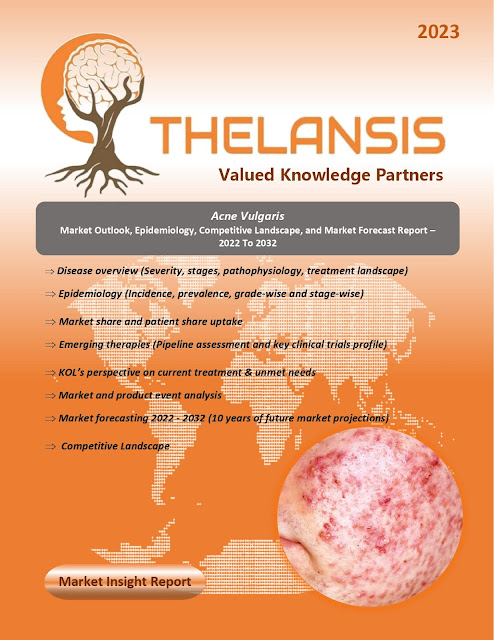Hutchinson-Gilford Progeria Syndrome (HGPS) – Market Outlook, Epidemiology, Competitive Landscape, and Market Forecast Report – 2023 To 2033
Hutchinson-Gilford progeria syndrome (HGPS), also called progeria, is a rare, fatal genetic childhood condition with striking features resembling premature aging. Children with progeria usually have a regular appearance in early infancy. At approximately nine to 24 months, affected children experience profound growth delays, resulting in short stature and low weight. Characteristic facial features include a head that is disproportionately large for the face, narrow nasal ridge, narrow nasal tip, thin vermilion of the upper and lower lips, small mouth, and retro- and micrognathia. Standard features include loss of subcutaneous fat, delayed eruption and loss of primary teeth, abnormal skin with small outpouchings over the abdomen and upper thighs, alopecia, nail dystrophy, coxa valga, and progressive joint contractures. Later findings include low-frequency conductive hearing loss, dental crowding, and partial lack of secondary tooth eruption. Motor and mental development are typical. Death occurs due to complications of severe atherosclerosis, either cardiac disease (myocardial infarction or heart failure) or cerebrovascular disease (stroke), generally between ages six and 20. The average life span is approximately 14.5 years. The skeletal defects observed in children with HGPS are unique and characteristic. These may include delayed closure of the “soft spot” at the front of the skull, an abnormally thin portion, and/or the absence of certain air-filled cavities within the head that open into the nose.
·
The prevalence of Progeria or
Hutchinson-Gilford progeria syndrome (HGPS) is approximately 1 to 2 cases per
20 million, with around 550 to 650 children living with progeria worldwide.
Thelansis’s
“Hutchinson-Gilford Progeria Syndrome (HGPS) Market Outlook, Epidemiology,
Competitive Landscape, and Market Forecast Report – 2023 To 2033" covers
disease overview, epidemiology, drug utilization, prescription share analysis,
competitive landscape, clinical practice, regulatory landscape, patient share,
market uptake, market forecast, and key market insights under the potential Hutchinson-Gilford
Progeria Syndrome (HGPS) treatment modalities options for eight major markets
(USA, Germany, France, Italy, Spain, UK, Japan, and China).
KOLs insights of Hutchinson-Gilford
Progeria Syndrome (HGPS) across 8 MM market from the centre of Excellence/
Public/ Private hospitals participated in the study. Insights around current
treatment landscape, epidemiology, clinical characteristics, future treatment
paradigm, and Unmet needs.
Hutchinson-Gilford
Progeria Syndrome (HGPS) Market Forecast Patient Based Forecast Model (MS.
Excel Based Automated Dashboard), which Data Inputs with sourcing, Market
Event, and Product Event, Country specific Forecast Model, Market uptake and
patient share uptake, Attribute Analysis, Analog Analysis, Disease burden, and
pricing scenario, Summary, and Insights.
Thelansis Competitive Intelligence (CI) practice
has been established based on a deep understanding of the pharma/biotech
business environment to provide an optimized support system to all levels of
the decision-making process. It enables business leaders in forward-thinking
and proactive decision-making. Thelansis supports scientific and commercial
teams in seamless CI support by creating an AI/ ML-based technology-driven
platform that manages the data flow from primary and secondary sources.
Tags: Hutchinson-Gilford
Progeria Syndrome (HGPS), Hutchinson-Gilford Progeria Syndrome (HGPS) market outlook, Hutchinson-Gilford Progeria Syndrome
(HGPS) competitive landscape, Hutchinson-Gilford
Progeria Syndrome (HGPS) market forecast, Thelansis,
Primary market research, KOL insights, Competitive Intelligence (CI)




Comments
Post a Comment